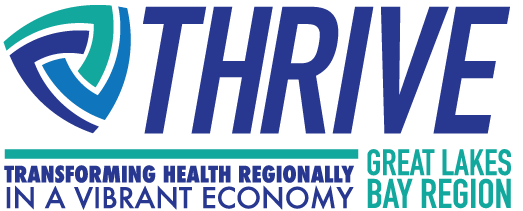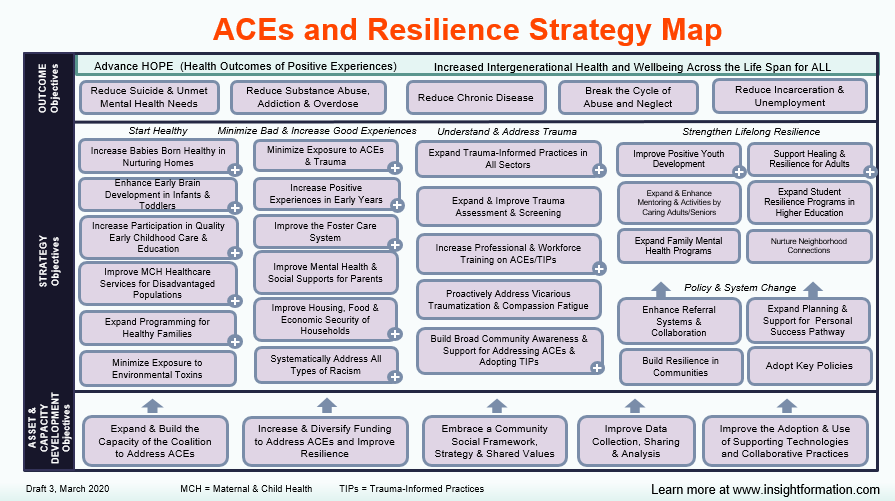
Regional Opioid Strategy
-
If you are interested in learning more about this specific intervention visit https://mihia.org/programs/opioid-strategy or email Shanna Hensler: s.hensler@mihia.org
-
If you are interested in learning more about THRIVE visit https://thrivegreatlakesbay.org or email: admin@thrivegreatlakesbay.org
-
If you would like to print, make a PDF or copy the URL to this page, please scroll to the top of this page and use the following buttons located in the upper left-hand portion that look like this:


Up to Date Progress
The progress-tracking graphic above is a handy visual aid designed for a "quick glance" update. The graphic color will update as we continue towards a path of successful completion of this intervention.




Implementation Stage Expansion Stage Scaling Stage Sustainability Stage
- Red: Signifies no work has been completed
- Orange: Signifies a plan has been created to begin work on the intervention
- Yellow: Signifies action has been created for the intervention
- Light Green: Signifies action has begun towards executing all of the objectives and some strategies are completed
- Dark Green: Signifies significant progress towards completion of all objectives
Intervention Progress per Objective and Strategy
Learn more by exploring the objectives below
Objective 1: Integrate an ACEs-Trauma-Informed Hub and coordination support into MiHIA’s backbone infrastructure
Strategy 1.1 - Convene a steering team
- Responsible Party: MiHiA & Interdisciplinary Center for Community Health & Wellness
- Data: Completed
- Target Completion Date: May 2019
- Progress Highlights and Significance: Creation of the steering team allows for the planning and composition of grant submission & objectives
Objective 2: Create an interactive regional ACEs-Resilience Strategy Map
Strategy 2.1 - Develop questionnaire to obtain regional information and compile inventory of ongoing initiatives
- Responsible Party: MiHiA & Interdisciplinary Center for Community Health & Wellness
- Data: First update of regional information completed Dec. 2019, next update scheduled June 2020, and quarterly thereafter
- Target Completion Date: Ongoing
- Progress Highlights and Significance: The strategy map is necessary to identify, support and replicate emergent and trauma-informed initiatives in the region.
Strategy 2.2 - Develop infrastructure and provide maintenance of a 14-county "Great Lakes Bay Regional ACEs-resilience Strategy Map" and develop community input/monitoring form
- Responsible Party: MiHiA & Interdisciplinary Center for Community Health & Wellness
- Data: Produced two (2) tutorials of map function and features for community partner audience and Built out resource hub to link community resources to the strategy map
- Target Completion Date: August 2019
- Progress Highlights and Significance: The strategy map is necessary to identify, support and replicate emergent and trauma-informed initiatives in the region.
Strategy 2.3 - Expand and implement “Call to Action” Speaker Circuit Initiative; Increase education on ACEs-Trauma Informed topics; Increase awareness on education and training opportunities
- Responsible Party: MiHiA & Interdisciplinary Center for Community Health & Wellness
- Data: Completed
- Target Completion Date: Ongoing
- Progress Highlights and Significance: The strategy map is necessary to identify, support and replicate emergent and trauma-informed initiatives in the region.
Strategy 2.4 Connect existing educational program opportunities for shared professional development and continuing educational collaborations
- Responsible Party: MiHiA & Interdisciplinary Center for Community Health & Wellness
- Data: Hosted Our Communities Listen session; hosting Dr. Heather Forkey events in 2020, developed Central Michigan University ACEs Podcasts, and hosted a Great Lakes Bay Region ACEs Symposium
- Target Completion Date: Ongoing
- Progress Highlights and Significance: The strategy map is necessary to identify, support and replicate emergent and trauma-informed initiatives in the region.
Objective 3: Provide Trauma Informed Care awareness, education and training opportunities to a variety of sectors including health care providers,employers, education, perinatal quality collaborative, faith-based leaders, and community-based coalitions"
Strategy 3.1 - Convene a learning network and recruit education/training providers and stakeholders
- Responsible Party: MiHiA & Interdisciplinary Center for Community Health & Wellness
- Data: Action has begun towards executing this objective
- Target Completion Date: September 30, 2019
- Progress Highlights and Significance: Trauma Informed Care awareness allows collaborative opportunities to share, promote, raise and leverage awareness of education and training opportunities across the region. Focus on these strategies have lead to a number of educational events and trainings which is significant because increased ACEs referrals and capacity which can lead to a positive impact on chronic health conditions, improve maternal and infant health and lower substance use/abuse rates and suicide rates.
Strategy 3.2 - Develop regional focused resource newsletters and identify regional programs for professional development and continuing education related to ACEs/Resilience
- Responsible Party: MiHiA & Interdisciplinary Center for Community Health & Wellness
- Data: Action has begun towards executing this objective
- Target Completion Date: Ongoing
- Progress Highlights and Significance: Trauma Informed Care awareness allows collaborative opportunities to share, promote, raise and leverage awareness of education and training opportunities across the region. Focus on these strategies have lead to a number of educational events and trainings which is significant because increased ACEs referrals and capacity which can lead to a positive impact on chronic health conditions, improve maternal and infant health and lower substance use/abuse rates and suicide rates.
Strategy 3.3 - Provide school districts with opportunities to increase awareness in ACEs; Identify and work with school Trauma Informed coalitions; Build out educational program deliverables in response to Strategy Map opportunities
- Responsible Party: MiHiA & Interdisciplinary Center for Community Health & Wellness
- Data: Action has begun towards executing this objective
- Target Completion Date: Ongoing
- Progress Highlights and Significance: Trauma Informed Care awareness allows collaborative opportunities to share, promote, raise and leverage awareness of education and training opportunities across the region. Focus on these strategies have lead to a number of educational events and trainings which is significant because increased ACEs referrals and capacity which can lead to a positive impact on chronic health conditions, improve maternal and infant health and lower substance use/abuse rates and suicide rates.
Strategy 3.4 - Increase Professional & Workforce Training on ACEs/TIP (Trauma Informed Practices)
- Responsible Party: MiHiA & Interdisciplinary Center for Community Health & Wellness
- Data: Action has begun towards executing this objective
- Target Completion Date: Ongoing
- Progress Highlights and Significance: Trauma Informed Care awareness allows collaborative opportunities to share, promote, raise and leverage awareness of education and training opportunities across the region. Focus on these strategies have lead to a number of educational events and trainings which is significant because increased ACEs referrals and capacity which can lead to a positive impact on chronic health conditions, improve maternal and infant health and lower substance use/abuse rates and suicide rates.
Strategy 3.5 - Enhance Referral Systems & Collaboration
- Responsible Party: MiHiA & Interdisciplinary Center for Community Health & Wellness
- Data: Action has begun towards executing this objective
- Target Completion Date: Ongoing
- Progress Highlights and Significance: Trauma Informed Care awareness allows collaborative opportunities to share, promote, raise and leverage awareness of education and training opportunities across the region. Focus on these strategies have lead to a number of educational events and trainings which is significant because increased ACEs referrals and capacity which can lead to a positive impact on chronic health conditions, improve maternal and infant health and lower substance use/abuse rates and suicide rates.
Strategy 3.6 - Provide five Michigan ACE Community Champion Training in the Great Lakes Bay Region
- Responsible Party: MiHiA & Interdisciplinary Center for Community Health & Wellness
- Data: Hosted two Michigan ACEs Community Champions trainings
- Target Completion Date: Ongoing
- Progress Highlights and Significance: Trauma Informed Care awareness allows collaborative opportunities to share, promote, raise and leverage awareness of education and training opportunities across the region. Focus on these strategies have lead to a number of educational events and trainings which is significant because increased ACEs referrals and capacity which can lead to a positive impact on chronic health conditions, improve maternal and infant health and lower substance use/abuse rates and suicide rates.
Strategy 3.7 - Host two ACEs Summits in Fall 2019 and Fall 2020 which will focus on taking action to address, prevent, and respond to ACEs via improved, practice, policy, and programming
- Responsible Party: MiHiA & Interdisciplinary Center for Community Health & Wellness
- Data: Action has begun towards executing this objective
- Target Completion Date: Ongoing
- Progress Highlights and Significance: Trauma Informed Care awareness allows collaborative opportunities to share, promote, raise and leverage awareness of education and training opportunities across the region. Focus on these strategies have lead to a number of educational events and trainings which is significant because increased ACEs referrals and capacity which can lead to a positive impact on chronic health conditions, improve maternal and infant health and lower substance use/abuse rates and suicide rates.
Objective 4: Identify organizational resources to continue the regional approach, including secure funding on a regional, state and national basis to sustain through 2023
Strategy 4.1 - Development of a regional sustainability plan, using a shared support and investment model.
- Responsible Party: MiHiA & Interdisciplinary Center for Community Health & Wellness
- Data: Action has begun towards executing this objective
- Target Completion Date: Ongoing
- Progress Highlights and Significance: This objective will be achieved by demonstrating the success and ability to replicate the process to other regions within the state and country on an annual and on-going basis
Objective 5: Develop a comprehensive evaluation plan
Strategy - 5.1 Create project evaluation plan that is embedded with implementation activities for each objective area
- Responsible Party: MiHiA & Interdisciplinary Center for Community Health & Wellness
- Data: Initial logic model developed
- Target Completion Date: June 2019
- Progress Highlights and Significance: The evaluation plan allows responsible parties to monitor and report out progress of the project’s implementation plan
Strategy 5.2 - Implement qualitative data gathering and sense-making processes in collaboration with the project team to inform progress, to tell the story of the initiative-in-action, and to identify lessons learned on the road to short/long-term outcomes and impacts
- Responsible Party: MiHiA & Interdisciplinary Center for Community Health & Wellness
- Data: Initiated project documentation processes, built protocols and implemented/refined protocols
- Target Completion Date: December 2019
- Progress Highlights and Significance: The evaluation plan allows responsible parties to monitor and report out progress of the project’s implementation plan
Strategy 5.3 - Provide inputs for project communications with stakeholders and funders that will aid MiHIA’s processes to: assess/track utilization, access, describe perceived impacts of MiHIA’s “Building Resilience” backbone resources
- Responsible Party: MiHiA & Interdisciplinary Center for Community Health & Wellness
- Data: Action has begun towards executing this objective
- Target Completion Date: December 2020
- Progress Highlights and Significance: The evaluation plan allows responsible parties to monitor and report out progress of the project’s implementation plan
Adverse Childhood Experiences (ACEs)
Building Resilience Communities in the Great Lakes Bay Region
According to the CDC, childhood experiences (both positive and negative) have a tremendous impact on future violence victimization and perpetration, and lifelong health and opportunity. Adverse Childhood Experiences (ACEs) have been linked to risky health behaviors, chronic health conditions, low life potential, and early death. As the number of ACEs increases, so does the risk for these outcomes. In the United States, it’s estimated that almost half of children have experienced at least one ACE and one fourth have experienced two or more. The wide-ranging health and social consequences of ACEs underscore the importance of preventing them before they happen.
Adverse Childhood Experiences Data
Region: MiHIA
(Compared to MI State Value)
Preventing Adverse Childhood Experiences in the Region
About the "Building Resilience" Program: This program will connect and synchronize diverse coalitions across the region with resources, professional development and consultative support to accelerate and share approaches for preventing and addressing ACEs, trauma, and toxic stress as critical social determinants of health.




